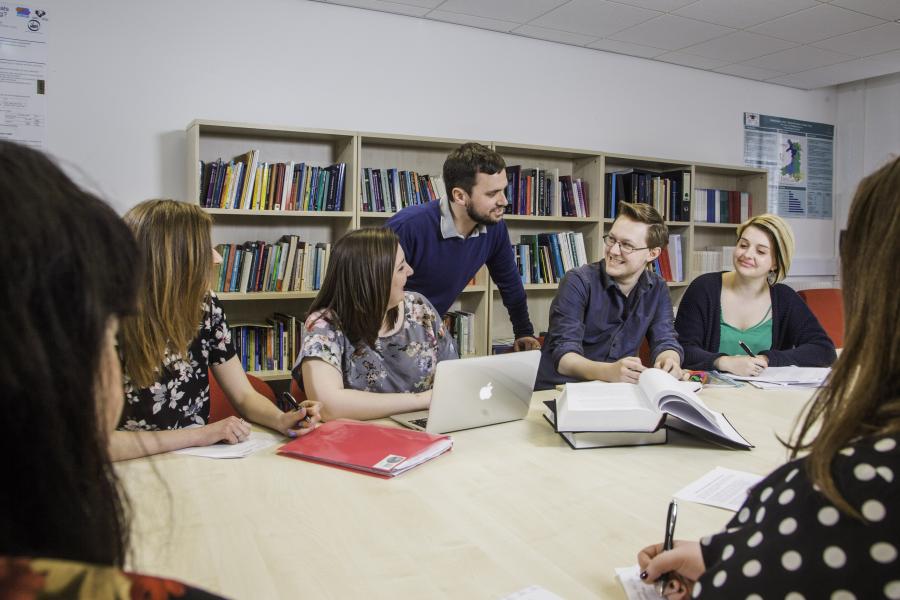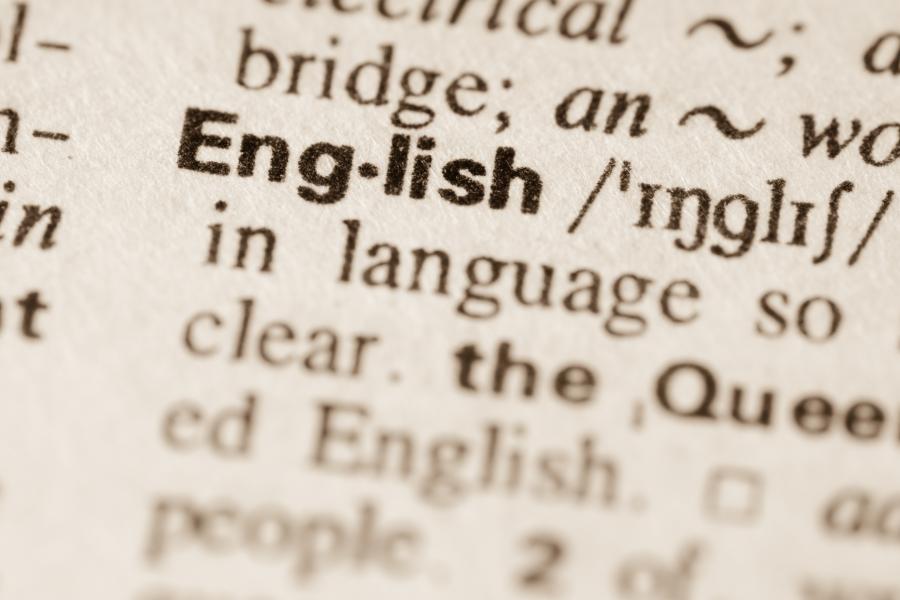About This Course
On this Linguistics and the English Language degree you will learn about, understand and interpret many aspects of human language. Our introductory and advanced modules will give you a strong foundational background and important scientific insight into the nature, structure and use of language, as well as into the history of English and sociolinguistics (the relationship between language and society). You will also be introduced to the tools and methods that will allow you to undertake your own investigations into English as well as other languages spoken around the world.
The English language component of this degree will give you the opportunity to learn about the grammatical structure of English (e.g., how words and sentences are formed), how meaning is made, interpreted and extended across whole discourses, how sounds are formed, produced, and understood, and how language use varies across speakers and groups and how it changes over time. You will also explore the history of English, the development and emergence English dialects and World Englishes, how English is used in society (e.g., how socio-cultural variables shape the use of English) and the role of English in society, in education and as a global lingua franca.
The linguistic elements of this degree will enable you to learn about, understand and interpret many aspects of human language. You will study the ‘science’ behind language, including possible sounds used in speech and their combination (phonetics, phonology), how words are built up morphology), what distinguishes sentences from just strings of words (syntax), meaning (semantics and pragmatics), the effect that society, culture and norms have upon language use (sociolinguistics) and how languages change over time.
Combining these two, complementary, subjects enable you to explore of the way in which language abilities develop, while also acquiring knowledge and capabilities in the use of English language.
Why choose Bangor University for this course?
- We are a vibrant, accessible, friendly department with staff committed to high-quality teaching, excellent student experience, strong pastoral support, and the integration of current cutting-edge research and topics into your lectures throughout the duration of your studies. We are also dedicated to ensuring that our Linguistics and English Language students develop excellent skills in critical thinking, data analysis, presentation and independent research to enhance their employability upon graduation.
- Our teaching staff are also active researchers in a range of applied and theoretical areas relating to Linguistics and English Language - many have international reputations in the field.
- You will gain a sound and scientific insight into the structure and use of language, its history and the relationship between language and society.
- Our state-of-the-art learning facilities include a professional grade sound / recording studio (our Speech laboratory), an eye tracking laboratory, and an event-related potential (ERP) laboratory and a corpus-linguistics resource facility. We also have audio and video equipment that can be checked out for field work. Our facilities also include an extensive collection of books on Linguistics and English Language and a language library which is maintained by our undergraduate student association - the Bangor Linguistics Society (BLS).
Additional Course Options
This course is available with a Placement Year option where you will study for 1 additional year. The Placement Year is undertaken at the end of the second year and students are away for the whole of the academic year.
The Placement Year provides you with a fantastic opportunity to broaden your horizons and develop valuable skills and contacts through working with a self-sourced organisation relevant to your degree subject. The minimum period in placement (at one or more locations) is seven calendar months; more usually you would spend 10-12 months with a placement provider. You would normally start sometime in the period June to September of your second year and finish between June and September the following year. Placements can be UK-based or overseas and you will work with staff to plan and finalise the placement arrangements.
You will be expected to find and arrange a suitable placement to complement your degree and will be fully supported throughout by a dedicated member of staff at your academic School and the University’s Careers and Employability Services.
You will have the opportunity to fully consider this option when you have started your course at Bangor and can make an application for a transfer onto this pathway at the appropriate time. Read more about the work experience opportunities that may be available to you or, if you have any questions, please get in touch.
This course is available with an International Experience Year option where you will study or work abroad for 1 additional year. You will have ‘with International Experience’ added to your degree title on graduating.
Studying abroad is a great opportunity to see a different way of life, learn about new cultures and broaden your horizons. With international experience of this kind, you’ll really improve your career prospects. There are a wide variety of destinations and partner universities to choose from. If you plan to study in a country where English is not spoken natively, there may be language courses available for you at Bangor and in your host university to improve your language skills.
You will have the opportunity to fully consider this option at any time during your degree at Bangor and make your application. If you have any questions in the meantime, please get in touch.
Read more about the International Experience Year programme and see the studying or working abroad options on the Student Exchanges section of our website.
Course Content
This course will be taught by a combination of lectures, tutorials and/or seminars, depending on the module and level. You will choose 120 credits of modules relating to Linguistics and/or the English Language each year, where you start by learning the foundational knowledge required to study in this field in the different subdisciplines (year 1), proceeding to more in-depth intermediate-level study (year 2), before choosing what areas to specialize in (year 3). Modules are assessed on the basis of different kinds of coursework, including essays, reports, oral presentations, tests, exams, data analysis, etc. You will do a dissertation in your final year which represents an original research project which you will undertake under the supervision of a research-active member of staff.
Modules for the current academic year
Module listings are for guide purposes only and are subject to change. Find out what our students are currently studying on the Linguistics and the English Language BA (Hons) Modules page.
Course content is for guidance purposes only and may be subject to change.
Facilities
- We have a Linguistics Lab where researchers can collect language data in a soundproof booth and using state-of-the-art audio software.
- The Bangor Linguistics Society has its own common room and library, full of resources for Linguistics and English Language students to use.
General University Facilities
Library and Archive Services
Our four libraries provide a range of attractive study environments including collaborative work areas, meeting rooms and silent study spaces.
We have an extensive collection of books and journals and many of the journals are available online in full-text format.
We house one of the largest university-based archives not only in Wales, but also the UK. Allied to the Archives is the Special Collections of rare printed books.
Learning Resources
There is a range of learning resources available, supported by experienced staff, to help you in your studies.
The University’s IT Services provides computing, media and reprographics facilities and services including:
- Over 1,150 computers for students, with some PC rooms open 24 hours a day
- Blackboard, a commercial Virtual Learning Environment, that makes learning materials available on-line.
Course Costs
General University Costs
Home (UK) students
- The cost of a full-time undergraduate course is £9,000 per year (2021/22 entry and 2022/23 entry).
- The fee for all placement, international, and sandwich years is £1,350 (2021/22 and 2022/23).
- More information on fees and finance for Home (UK) students.
International (including EU) students
Additional Costs
There are also some common additional costs that are likely to arise for students on all courses, for example:
- If you choose to study abroad or take the International Experience Year as part of your course.
- If you attend your Graduation Ceremony, there will be a cost for gown hire (£25-£75) and cost for additional guest tickets (c.£12 each).
Course-specific additional costs
Depending on the course you are studying, there may be additional course-specific costs that you will be required to meet. These fall into three categories:
- Mandatory Costs: these are related to a particular core or compulsory module that you’ll be required to complete to achieve your qualification e.g. compulsory field trips, uniforms for students on placement, DBS Check.
- Necessarily Incurred Costs: these may not be experienced by all students, and will vary depending on the course e.g. professional body membership, travel to placements, specialist software, personal safety equipment.
- Optional Costs: these depend on your choice of modules or activity and they are shown to give you an indication of the optional costs that may arise to make sure your choice is as informed as possible. These can include graduation events for your course, optional field trips, Welcome Week trips.
Entry Requirements
Offers are tariff based, 96 - 128 tariff points from a Level 3 qualification* e.g.:
- A Levels: English Literature/English Language/English preferred but not required; General Studies and Key Skills not normally accepted.
- BTEC National Extended Diploma: MMM - DDM
- Cambridge Technical Extended Diploma: MMM- DDM
- City & Guilds Advanced Technical Extended Diploma (1080): considered on a case-by-case basis
- International Baccalaureate Diploma: including grade H5 in English Literature/Language
- Access: pass required
- Welsh Baccalaureate: We will accept this qualification in conjunction with other level 3 qualifications
- T Levels: T Levels in a relevant subject considered on a case-by-case basis
- Extended Project Qualification: Points can include a relevant Extended Project (EPQ) but must include a minimum 2 full A-levels, or equivalent.
We are happy to accept combinations of the qualifications listed above, as well as alternative Level 3 qualifications such as City & Guilds, Access and Cambridge Technical Diplomas.
We also welcome applications from mature learners.
International Candidates: International Candidates: school leaving qualifications that are equivalent to A levels/Level 3 and/or college diplomas are accepted from countries worldwide (subject to minimum English Language requirements). More information can be found on our International pages.
*For a full list of accepted Level 3 qualifications, go to www.ucas.com.
General University Requirements
To study for a degree, you’ll be asked for a minimum of UCAS Tariff points. For a fuller explanation of the UCAS Tariff Points, please see www.ucas.com.
We accept students with a wide range of qualifications and backgrounds and consider each application individually.
All students need to have good basic skills and the University also values IT and communication skills.
As part of the University’s policy, we consider applications from prospective disabled students on the same grounds as all other students.
We also consider applications from mature students who can demonstrate the motivation and commitment to study a university programme. Each year we enrol a significant number of mature students. For more information about studying as a mature student, see our Studying at Bangor section of the website.
EU and International Students' Entry Requirements
For detailed guidance on the entry requirements for EU and International Students, including the minimum English Language entry requirement, please visit the Entry Requirements by Country pages. International applicants can also visit the International Education Centre section of our website for further details.
Bangor University offers International Incorporated Bachelor Degrees for International students whose High School qualification is not equivalent to the UK school leaving qualification. The first year (or Year 0) is studied at Bangor University International College, an embedded College on our University campus and delivered by Oxford International Education Group.
Careers
A degree in Linguistics and English Language provides subject knowledge and expertise. You will also develop important transferrable skills valued by a range of employers. These include critical reading and evaluation, research and analytical skills, project management skills, proficiency in diverse modes of presentation (written, electronic and spoken), problem solving skills, experience working independently, time management and team-work experience, information technology skills, and the chance to develop effective interpersonal communication.
Linguistics and English Language graduates gain a broad range of skills applicable in a variety of occupations, such as media, education, advertising, management, government, research, health, translation, interpreting, publishing, civil service, speech therapy, community work (e.g., related to language policy and engagement), etc. In some cases, you will need further training and qualifications beyond what this course provides. A career in research is also an option, as is postgraduate study.
Opportunities at Bangor
The University’s Careers and Employability Service provides a wide range of resources to help you achieve your graduate ambitions.
The Bangor Employability Award (BEA)
The BEA is a comprehensive online course that you can work through at your own pace, taking you through all the steps you need to take to explore, prepare and apply for your dream career.
Internships
Bangor University runs a paid internship scheme within the university’s academic and service departments.
Student Volunteering
Volunteering widens your experience and improves your employability. Find out more about volunteering on the Students’ Union’s website.
Foundation Year
There is a ‘with Foundation Year’ option available for this course. Apply for English Language and English Literature (with Foundation Year).
What is a Foundation Year course?
If you don’t have the required qualifications for the degree-level course or are looking to re-enter education after time away from study, then a Foundation Year Programme might be the right choice for you.
The Foundation Year is an excellent introduction to studying this subject at university and will provide you with the knowledge, skills and confidence required to go on to study this course at degree-level.
When you have successfully completed the Foundation Year, you can progress on to the first year of this degree-level course.






